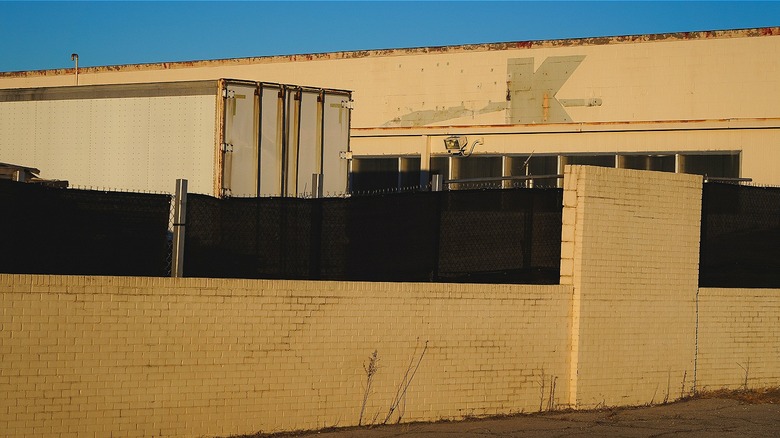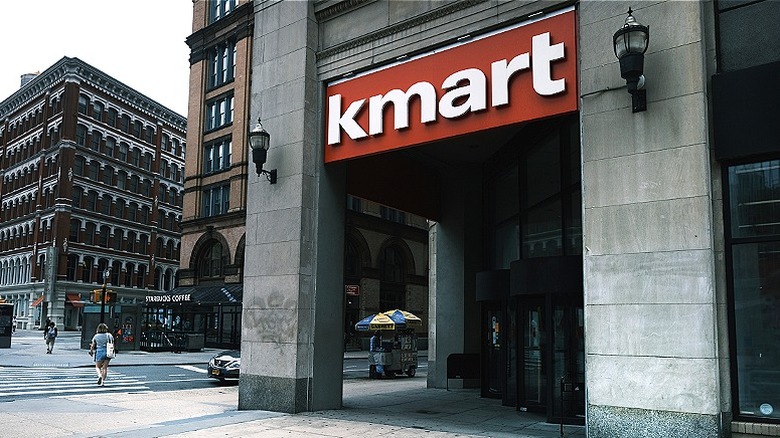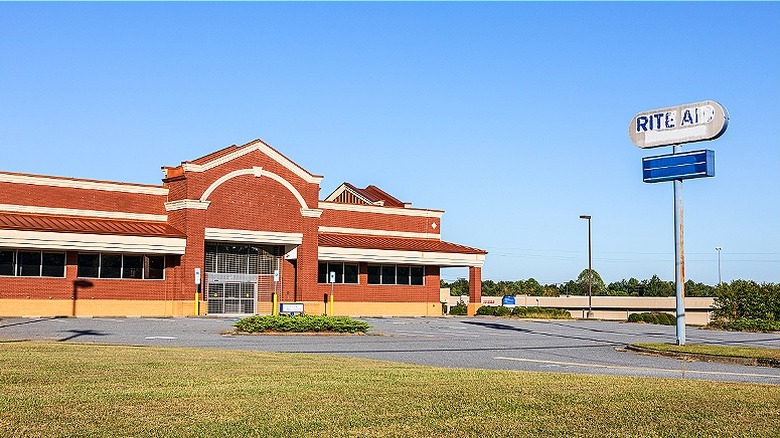One Of America's Biggest Discount Retailers Is Closing Its Last Full-Size US Store
If it feels like everywhere you look in 2024, yet another store is closing, you're not crazy. In fact, according to August 2024 data from Coresight Research, store closings in the U.S. have outpaced store openings. And if 2024 continues along the same trajectory, this will be the first time since pandemic-laden 2021 that store closures surpass new openings.
While businesses across multiple industries have struggled to remain open following the pandemic (restaurants in particular have struggled in 2024, for example), others have had to call it quits. While it can be easy to blame the pandemic for everything, it is worth noting that there were many large U.S. companies already on their way out pre-pandemic. Most notable among them, Kmart. From blue light specials to pioneering big-box store concepts, the company was once one of the country's largest discount retailers. However, in the face of online shopping and other upstart retail options, Kmart failed to ever regain its peak from the 1990s.
Despite once having 2,500 stores across the U.S., Kmart's last full-size store, in Bridgehampton, New York, is scheduled to close on October 20, 2024. This will leave only a small-store concept in Miami remaining in the contiguous U.S. (there are still locations in both Guam and the U.S. Virgin Islands). While many different factors contributed to the company's eventual downfall, the lack of adaptation as consumer shopping habits changed was easily Kmart's biggest fault. Let's dive into the company's long-time-coming end, as well as some other companies heading for similar fates.
Kmart's downfall
You may be surprised to learn the beginning of the end for Kmart actually started back in 2002 when the company became the third largest in the U.S. to ever file for Chapter 11 bankruptcy protection (joining a long list of retail chains that have gone bankrupt). At the time, it announced it would close more than 250 of its then-2,000 stores. After a bankruptcy restructuring and the influx of new much-needed money (courtesy of hedge fund manager Eddie Lampert, who was looking to revive the brand), Kmart looked poised for a second chance.
In 2004, Kmart acquired another U.S. retail giant, Sears, which made the conglomerate group (Sears Holding) the country's third-largest retailer. However, increasing competition from other low-price retailers like Walmart and Target, as well as the growth of Amazon, further hurt both brands' abilities to return to their most successful days. This, combined with the 2008 recession, served to derail any plans for Kmart or Sears to remain competitive.
Sears Holding filed for bankruptcy in 2018, which ultimately brought down both Kmart and Sears. At the time, it was reported that the sales at Kmart had fallen from $31 billion (in 2004) across 1,511 stores to just $5.8 billion in 2018 from less than 750 stores. Despite the company exiting bankruptcy in 2019 with 223 Sears and 202 Kmart stores, Sears has just 12 remaining stores in the U.S., while the last full-size Kmart store closes this month.
Other store closures to look out for
Kmart and Sears aren't alone. In fact, more than 1,600 stores are slated to close by the end of 2024. One of America's largest remaining discount retailers, Big Lots, is set to close even more stores this year. Despite closing 300 locations earlier in 2024, Big Lots announced another 250 stores would be closing. Among retailers with more specific merchandise, shoe retailer Foot Locker announced in 2023 that it would close 400 locations by 2026 (in a "reset" for the company), while Bath & Body Works similarly announced the closure of about 50 locations. Rite Aid, meanwhile, which filed for bankruptcy in October 2023, has closed more than 500 locations since exiting bankruptcy (which is about one quarter of its total pharmacies). Home goods retailer Bed Bath & Beyond ended up closing all of its remaining 360 stores in 2023, becoming an online-only retailer owned by Overtsock.com.
However, it's worth remembering that not all companies moving forward with store closures are necessarily in trouble. Foot Locker, for one, announced its closures while at the same time sharing plans for hundreds of new standalone concept stores that would focus on community, power, and play, as reported by CBS News. Meanwhile, Best Buy, one of the largest electronics retailers in the U.S., has been intentionally closing locations as part of a larger company shift. By shifting its store-concept models to reduce multiple stores in certain areas, as well as introduce smaller locations, the company hopes to better serve customers who might have moved away from more traditional big-box locations.
As consumer behaviors shift, and more people rely on online shopping, it will be increasingly important for retailers to pivot their business models to meet new and different demands. Hopefully retailers today will fare better than Kmart did.


